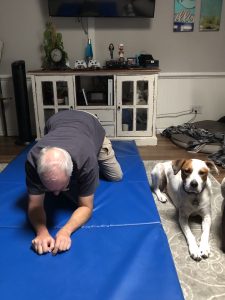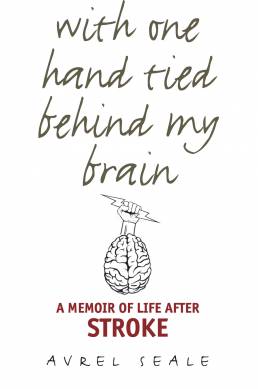I have always liked journeys.
Which are not travels.
On journeys, you walk a path and feel the experience. On travels, you can easily remain on the surface of the experience.
I like writers who can bring you on a journey with their story, and make you feel what they have felt.
My friend Avrel Seale, writer and musician, brings us on an interesting journey with his book With One Hand Tied behind My Brain: A Memoir of Life after Stroke, where he narrates with irony, fun, wit and poetry what happens within the drama of a stroke.
Excerpts from the book:
All we can do is model resilience. That’s all I could do, so that if, God forbid, one of them [my children] does meet with a catastrophe, they might remember how their old man was—how he got back up and got back to work. How, when the stroke tried to take away his right hand, he gave it the finger with his left.
The thing that distinguished a good nurse was the ability to see my real needs, to see beyond the protocol. I became quite frustrated at having to explain my situation over and over and over again… My favorite nurse was Richard, about my age, from Lake Charles, Louisiana. He got me… He treated me with the utmost respect and kindness, as his intellectual equal. But for too many, protocol was the alpha and the omega.
I was learning an astonishing fact: that my care was directed by a kind of doctor I didn’t even know existed, a doctor imbedded inside my health insurance company. That is to say, all the ultimate decisions about my treatment—what was allowed and what was denied—were made by people who had never even laid eyes on me. Let’s let that sink in for a moment. In fact, there was a perfect inverse correlation between a person’s familiarity with me and their power to affect my treatment: therapists knew me best by far, and they had the least say in the duration or the tempo of my treatment. I only discovered that the insurance company had an in-house physician when Dr. Li—a faceless, formless man—would deny covering the next step of recovery as “medically unnecessary.”
In the early days, I referred to my right hand in a variety of ways, usually meant to leaven the situation. One of these nicknames was “the monkey paw.” This usually got a knowing laugh out of fellow strokees, as they each had one of their own. But Kirstin [my wife] did not like the reference, not one bit, and she told me so. At first, I bristled. It was my hand; why should I not be able to call it the monkey paw or anything else I pleased? It didn’t work! Then I would feel how she would stroke my hand softly, would look at it lovingly, sometimes even would speak directly to it with soft, supportive words of encouragement. It was the first time I had ever considered that I had been or could be disrespectful to a part of my own body. Soon enough, I realized she was right. I stopped trying so hard to be Mr. Irreverence, and limited myself to a value-neutral nickname for my right hand I had floated early on in the process that she seemed to like, “Pancho,” because, well—you get it.
I also noticed that none of the therapists would use the word “help”; it was always “assist,” “offering assistance.” As a writer from the Orwell school and a defender of the virtue of plain English, I was against this sort of thing. Help is “help.” “Arm” is a perfectly sufficient word. A fall is a “fall”—not a “floor transfer.” Again, these things were said with the best of intentions, but were nonsense and only moved the finish line, only delayed understanding. Clearly, this was part of their training, but it was folly.
A Japanese proverb says: “Nana karaobi ya oki”, 7 times you fall, 8 times you get up. We always have to be ready to get up one more time if necessary. Avrel did it and it is a great inspiration for all of us.
Any time we fall, we have to be ready to stand up again. With our head held high.

With One Hand Tied behind My Brain: A Memoir of Life after Stroke by Avrel Seale
